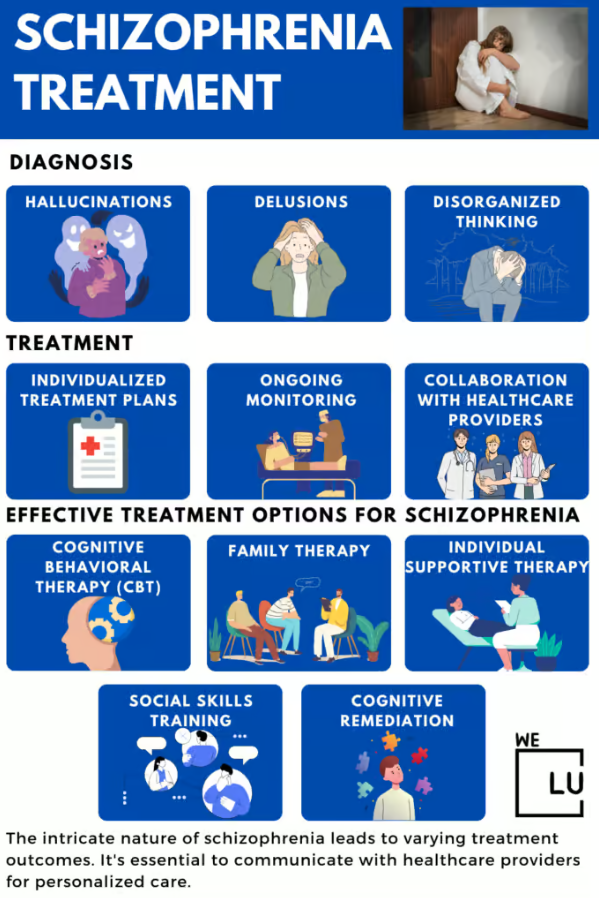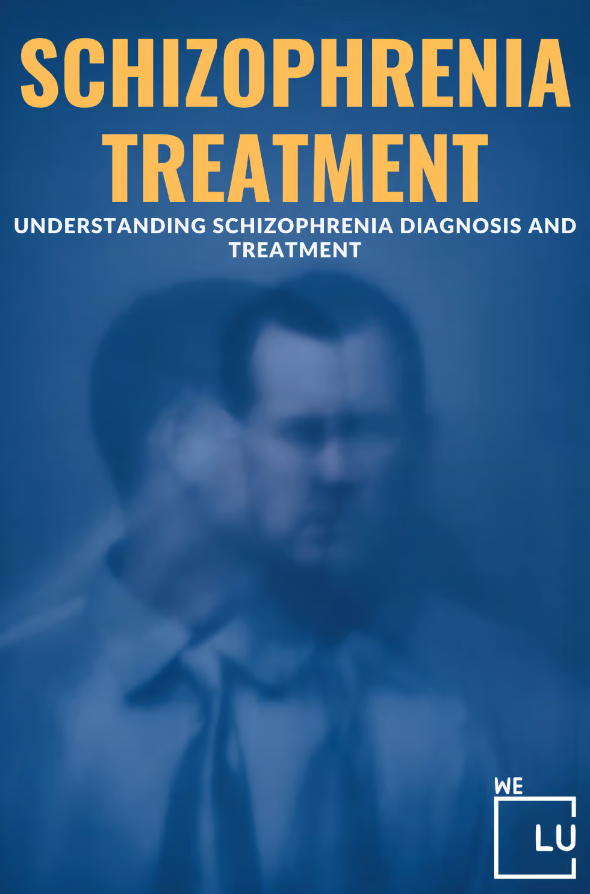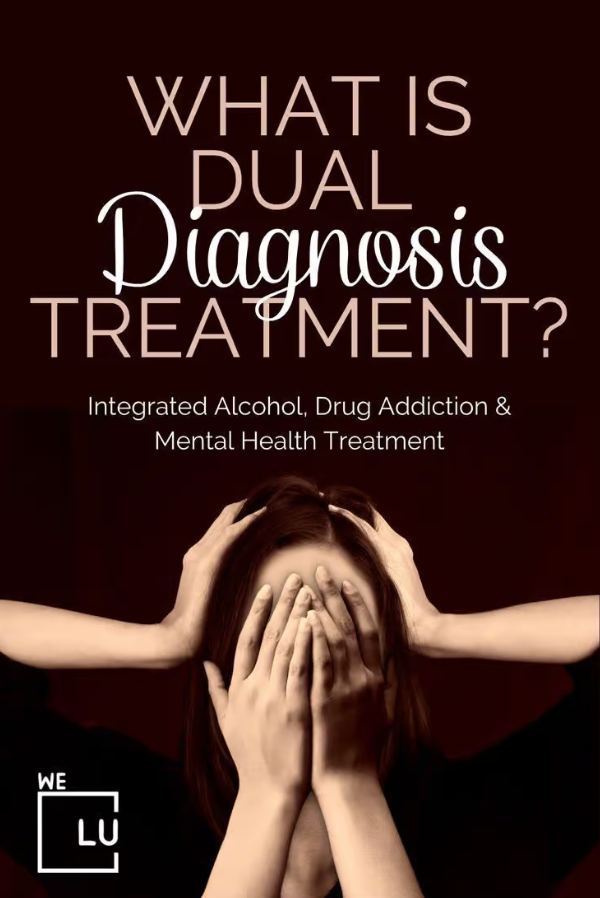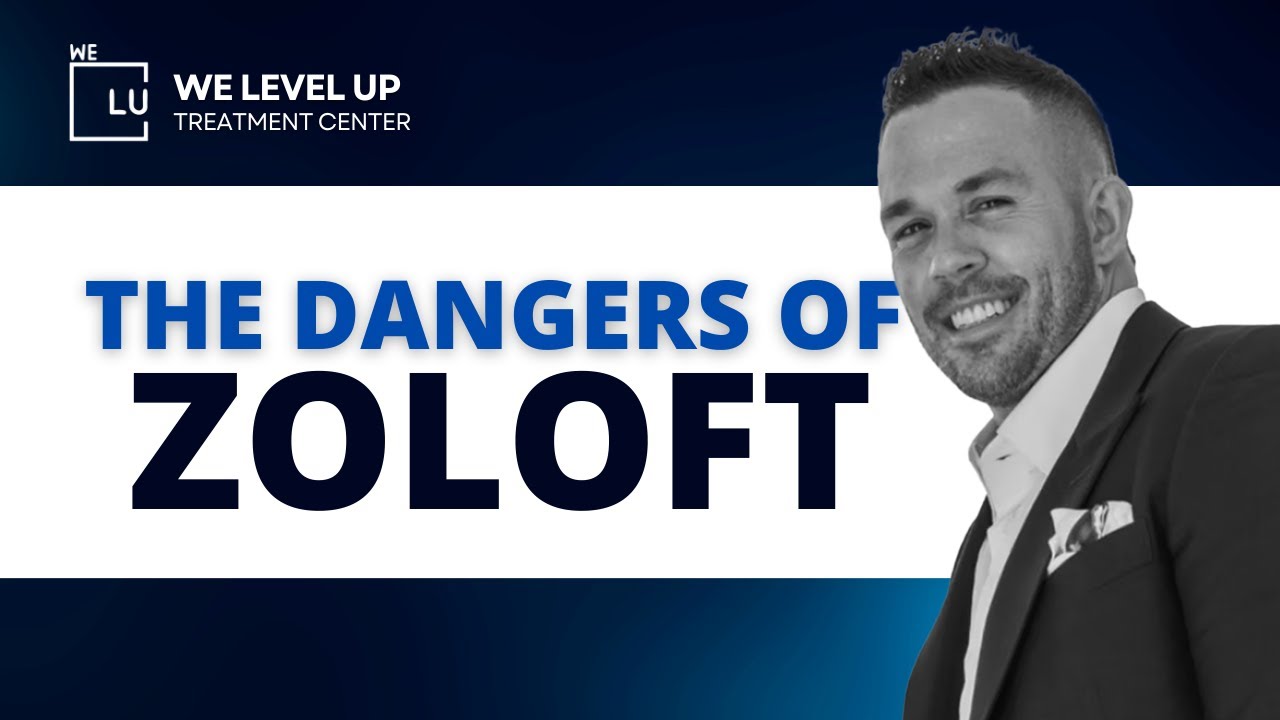Schizophrenia is typically treated with a personalized combination of therapy and medication. Early intervention teams, usually composed of psychiatrists, psychologists, mental health nurses, social workers, and support workers, are often involved during the initial episode of schizophrenia. Depending on your needs, you may contact specific mental health professionals regularly or receive support from the entire mental health team for a comprehensive schizophrenia treatment.
The Link Between Schizophrenia and Alcohol Abuse
According to research published in the National Center for Biotechnology Information (NCBI), 47% of individuals with schizophrenia will also experience a co-occurring substance use disorder during their lifetime. [1]
Psychotic disorders often go hand in hand with drug and alcohol issues. At We Level Up Texas schizophrenia treatment center and dual diagnosis rehab, we specialize in helping clients deal with both. Take the first step to reclaim your life—call us anytime for a free consultation.
What is Schizophrenia?
Schizophrenia brings thinking and perception troubles like delusions and hallucinations. It also lessens daily life abilities, causing speech problems and motivation loss. While there’s no cure, talk therapy, medication, and support from loved ones can help manage symptoms.
Schizophrenia Symptoms
To diagnose schizophrenia, we need to rule out other factors like substance abuse or medical conditions that could be causing similar symptoms. This involves a physical exam, tests, and discussing your thoughts, feelings, and family history.
The most common symptoms of schizophrenia include:
- Delusions.
- Hallucinations.
- Disorganized thinking.
- Speech difficulties.
- Lack of motivation.
- Anhedonia.
- Social withdrawal.
- Decreased emotional expression.
- Cognitive deficits.
Treatments of Schizophrenia
Schizophrenia needs ongoing care, even when things get better. Medicines and talking therapy can help. Sometimes, a hospital stay might be necessary.
A skilled psychiatrist usually leads the treatment, and there might be a team with a psychologist, social worker, nurse, and case manager. This team approach is common in clinics that specialize in treating schizophrenia.


Skip To:
Learn More:
Schizophrenia Medication
Schizophrenia treatment often involves medications, mainly antipsychotics. Your willingness to cooperate can influence the choice, like getting injections instead of pills if needed.
Because of possible adverse effects, some people can be reluctant to take drugs. Make sure to discuss benefits and side effects with your doctor. These medications function by altering dopamine in the brain, and managing symptoms at the lowest possible effective dosage is the goal. To discover the right drug, your psychiatrist may change the kind or dosage.
It is also possible to utilize other medications, such as antidepressants or anti-anxiety meds. The results take a few weeks to manifest.
Newer, Second-Generation Antipsychotics (Lower risk of severe side effects)
- Aripiprazole (Abilify).
- Asenapine (Saphris).
- Brexpiprazole (Rexulti).
- Cariprazine (Vraylar).
- Clozapine (Clozaril, Versacloz).
- Iloperidone (Fanapt).
- Lurasidone (Latuda).
- Olanzapine (Zyprexa).
- Paliperidone (Invega).
- Quetiapine (Seroquel).
- Risperidone (Risperdal).
- Ziprasidone (Geodon).
First-Generation Antipsychotics (Discuss thoroughly with your doctor the possible side effects)
- Chlorpromazine.
- Haloperidol.
- Fluphenazine.
- Perphenazine.
- Thioridazine.
- Trifluoperazine.
- Loxapine.
- Molindone.
Long-Acting Injectable Antipsychotics
- Aripiprazole (Abilify Maintena, Aristada).
- Fluphenazine decanoate.
- Haloperidol decanoate.
- Paliperidone (Invega Sustenna, Invega Trinza).
- Risperidone (Risperdal Consta, Perseris).
FDA-Approved Medicines for Schizophrenia Chart
| Medication | Side Effects | Timeline | Precautions |
|---|---|---|---|
| Risperidone | Weight gain, drowsiness, restlessness | Improvement in weeks | Regular monitoring for side effects |
| Olanzapine | Increased appetite, dizziness, dry mouth | Effects in a few weeks | Monitor weight and blood sugar regularly |
| Quetiapine | Sleepiness, constipation, dizziness | Improvement in a few weeks | Caution with activities requiring alertness |
| Aripiprazole | Nausea, insomnia, restlessness | Noticeable effects in weeks | Monitor for mood changes, especially at the start |
Psychotherapy for Schizophrenia
After the intense phase of schizophrenia treatment, along with taking meds, therapy, and social interventions are critical. This includes talking therapy to normalize thoughts and manage stress, social skills training for better interaction, family therapy for support, and job assistance for work preparation and stability. Daily living support is often needed, and community programs can assist with jobs, housing, and crises.
With adequate care, most people with schizophrenia can handle their condition.
These are the most popular therapies for schizophrenia:
- Cognitive Behavioral Therapy (CBT).
- Supportive Therapy.
- Family Therapy.
- Social Skills Training.
- Cognitive Enhancement Therapy (CET).
- Psychosocial Rehabilitation.
- Acceptance and Commitment Therapy (ACT).
Inpatient Treatment for Schizophrenia
Aside from inpatient treatment programs, hospitalization may be required during crisis episodes or periods of severe psychotic symptoms to provide essential cleanliness, safety, and appropriate diet and sleep.
If you’re struggling with psychotic disorders, such as schizophrenia, get resources about treatment counseling today. Start getting support with a free call to our mental health and addiction hotline.
Get Help. Get Better. Get Your Life Back.
Searching for Accredited Drug and Alcohol Rehab Centers Near You? We Level Up Texas Is Opening Soon!
Even if you have failed previously and relapsed, or are in the middle of a difficult crisis, we stand ready to support you. Our trusted behavioral health specialists will not give up on you. When you feel ready or just want someone to speak to about therapy alternatives to change your life call us. Even if we cannot assist you, we will lead you to wherever you can get support. There is no obligation. Call our network hotline today.
FREE Addiction Hotline – Call 24/7What Causes Schizophrenia?
Schizophrenia has a wide variety of intricate causes. This mental health problem develops as a result of several variables, both environmental and hereditary. Comprehending these fundamental elements can offer a valuable understanding of the source of schizophrenia.
The most common factors are:
- Genetics.
- Brain Structure and Chemistry.
- Prenatal Factors.
- Environmental Stressors.
- Substance Use.
Coping Tips and Support for Family Members of Schizophrenics
Dealing with a mental disorder as severe as schizophrenia can be challenging, both for the individual with the condition and for friends and family. Here are some ways to cope:
- Educate Yourself About Schizophrenia.
- Communicate Openly.
- Seek Support for Yourself.
- Set Realistic Expectations.
- Encourage Treatment for Your Loved One.
- Take Care of Yourself.
- Establish Routine.
- Foster Independence.
- Be Patient.
- Make a Stress-Free Environment.
Schizophrenia Test and Diagnosis
To be diagnosed with schizophrenia, you need to show at least two of these symptoms most of the time for a month and some mental disturbance over six months:
- Delusions (false beliefs).
- Hallucinations (seeing or hearing things that aren’t real).
- Disorganized speech and behavior.
- Catatonic or coma-like daze.
- Bizarre or hyperactive behavior.
To get a diagnosis, see a doctor and share your observations. They’ll do a psychological evaluation and a medical exam and ask about family history and past mental health.
Schizophrenia and Substance Abuse Co-occurring Disorder
Substance abuse frequently emerges as a coping mechanism for individuals struggling with mental health challenges, such as schizophrenia, and starting to misuse alcohol or drugs for short-term relief. This pattern can escalate into repetitive self-medication, dependency, and eventual addiction. Furthermore, individuals initially free from mental health issues may develop psychological drug dependence, resulting in secondary concerns like schizophrenia.
Recognizing addiction as a mental disorder introduces complexity to the interplay between substance abuse and psychotic disorders. Regrettably, many treatment centers lack sufficient expertise in managing dual-diagnosed requirements.
The We Level Up Texas’s specialized dual diagnosis treatment center is well-equipped to address co-occurring disorders through a comprehensive tandem treatment approach.
If you’re seeking assistance with your schizophrenia treatments, reach out to a We Level Up Texas treatment professional today—your call is free and confidential.
Opening Soon! First-Class Facilities & Amenities
World-Class High-Quality Addiction & Mental Health Rehabilitation Treatment
Coming Soon! Rehab Centers TourRenowned Addiction Centers. Serene Private Facilities. Inpatient Rehab Programs Vary.
FREE Addiction Hotline – Call 24/7Proven recovery success experience, backed by a Team with History of:
15+
Years of Unified Experience
100s
5-Star Reviews Across Our Centers
10K
Recovery Success Stories Across Our Network
- Low Patient to Therapist Ratio
- Onsite Medical Detox Center
- Comprehensive Dual-Diagnosis Treatment
- Complimentary Family & Alumni Programs
- Coaching, Recovery & Personal Development Events

We Level Up Texas Dual Diagnosis Inpatient Treatment for Schizophrenia and Addiction
At We Level Up Texas inpatient schizophrenia treatment and dual diagnosis rehab, our healthcare professionals advocate for addressing both underlying issues and addiction simultaneously to enhance the likelihood of successful, relapse-free recovery.
Our approach involves identifying and treating mental health problems linked to alcohol or drug dependency, promoting individuals toward long-term sobriety. We reject a one-size-fits-all recovery program, and upon admission to our dual diagnosis treatment center, our treatment staff will conduct a thorough physical and psychological assessment by our experienced team. This assessment guides the creation of an individualized approach, integrating dual diagnosis treatment when needed, given the complex and similar symptoms accompanying addiction and co-occurring disorders.
Treating Both Schizophrenia and Substance Abuse
Acknowledging a potential mental illness can be challenging, but obtaining the correct diagnosis and treatment significantly enhances the effectiveness of addressing ongoing drug addiction, a task best undertaken by trained medical professionals. Substance use disorders often emerge as a means to cope with self-esteem issues and social status concerns or as a form of self-medication, with roots ranging from situational factors to brain imbalances.
Recognizing and addressing mental health issues is crucial for more effective treatment of concurrent drug addiction. Professional guidance is essential to identify underlying conditions, and dual diagnosis treatment typically includes detox and a focused residency program to equip individuals with tools for long-term recovery.
Are you searching for schizophrenia medications and a schizophrenia treatment center? Get a free rehab insurance check without any obligation. The result can help you explore several treatment options.
Warning Signs of Schizophrenia, Symptoms, Causes, Risks, Triggers, and Effective Treatment | Informative Video
Start a New Life
Begin with a free call to an addiction & behavioral health treatment advisor. Learn more about our dual-diagnosis programs. The We Level Up treatment center network delivers recovery programs that vary by each treatment facility. Call to learn more.
- Personalized Care
- Caring Accountable Staff
- World-class Amenities
- Licensed & Accredited
- Renowned w/ 100s 5-Star Reviews
We’ll Call You
Search We Level Up Texas Schizophrenia Treatment, Dual Diagnosis Topics, and Resources
Sources
- Schizophrenia Definition: Busch AB, Frank RG, Lehman AF, Greenfield SF. Schizophrenia, co-occurring substance use disorders and quality of care: the differential effect of a managed behavioral health care carve-out. Adm Policy Ment Health. 2006 May;33(3):388-97. Doi: 10.1007/s10488-006-0045-3. PMID: 16755397; PMCID: PMC2084476.
- Hany M, Rehman B, Azhar Y, et al. Schizophrenia. [Updated 2023 Mar 20]. In: StatPearls [Internet]. Treasure Island (FL): StatPearls Publishing; 2023 Jan-. Available from: https://www.ncbi.nlm.nih.gov/books/NBK539864/
- Patel KR, Cherian J, Gohil K, Atkinson D. Schizophrenia: overview and treatment options. P T. 2014 Sep;39(9):638-45. PMID: 25210417; PMCID: PMC4159061. What are symptoms of schizophrenia? Schizophrenia meaning & schizophrenia causes.
- Drake RE, Mueser KT. Co-Occurring Alcohol Use Disorder and Schizophrenia. Alcohol Res Health. 2002;26(2):99–102. PMCID: PMC6683824.
- Trifu SC, Kohn B, Vlasie A, Patrichi BE. Genetics of schizophrenia (Review). Exp Ther Med. 2020 Oct;20(4):3462-3468. Doi: 10.3892/etm.2020.8973. Epub 2020 Jul 7. PMID: 32905096; PMCID: PMC7465115.
- Henriksen MG, Nordgaard J, Jansson LB. Genetics of Schizophrenia: Overview of Methods, Findings and Limitations. Front Hum Neurosci. 2017 Jun 22;11:322. Doi: 10.3389/fnhum.2017.00322. PMID: 28690503; PMCID: PMC5480258.
- Morin L, Franck N. Rehabilitation Interventions to Promote Recovery from Schizophrenia: A Systematic Review. Front Psychiatry. 2017 Jun 12;8:100. Doi: 10.3389/fpsyt.2017.00100. PMID: 28659832; PMCID: PMC5467004.
- Mitra S, Mahintamani T, Kavoor AR, Nizamie SH. Negative symptoms in schizophrenia. Ind Psychiatry J. 2016 Jul-Dec;25(2):135-144. Doi: 10.4103/ipj.ipj_30_15. PMID: 28659691; PMCID: PMC5479085.
- Correll CU, Schooler NR. Negative Symptoms in Schizophrenia: A Review and Clinical Guide for Recognition, Assessment, and Treatment. Neuropsychiatr Dis Treat. 2020 Feb 21;16:519-534. Doi: 10.2147/NDT.S225643. PMID: 32110026; PMCID: PMC7041437.
- Ruiz-Castañeda P, Santiago Molina E, Aguirre Loaiza H, Daza González MT. Positive symptoms of schizophrenia and their relationship with cognitive and emotional executive functions. Cogn Res Princ Implic. 2022 Aug 12;7(1):78. Doi: 10.1186/s41235-022-00428-z. PMID: 35960384; PMCID: PMC9374871.







